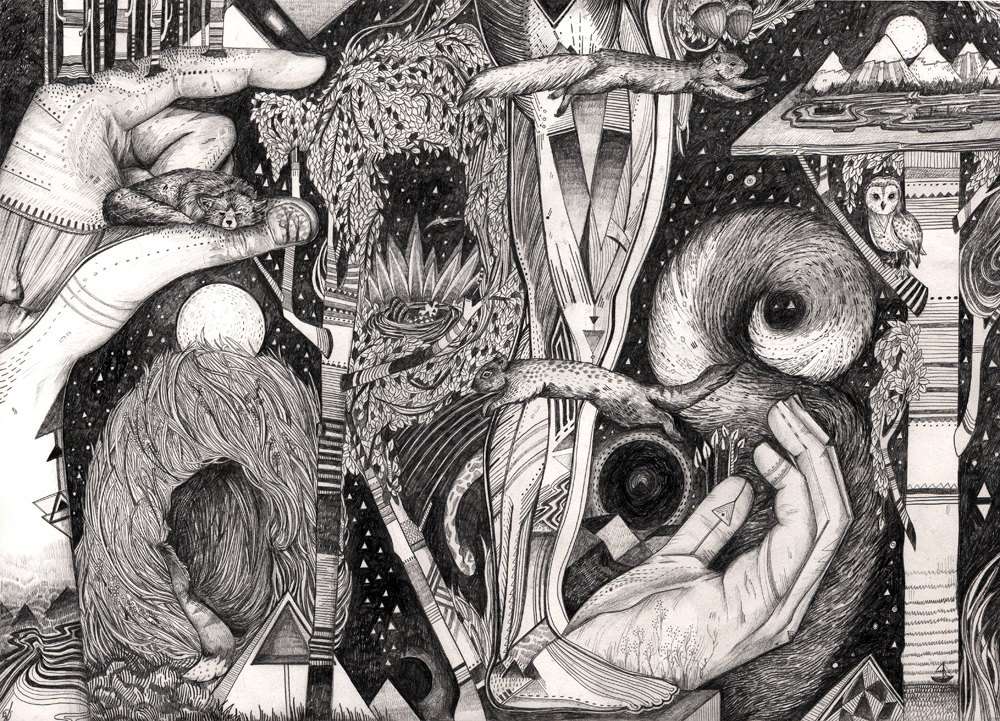
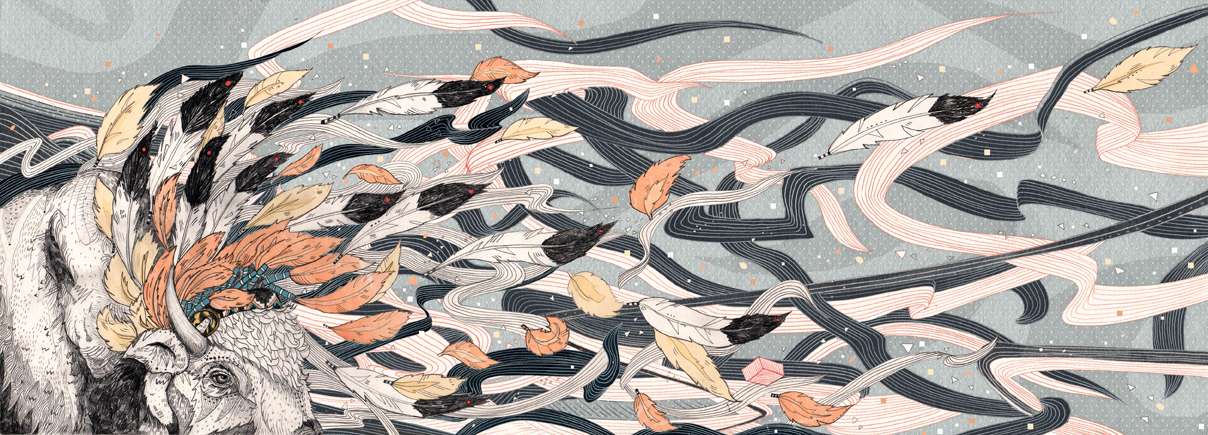
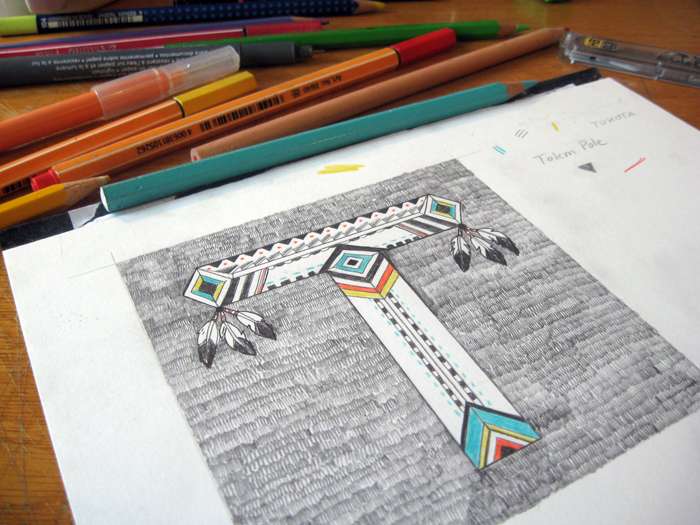
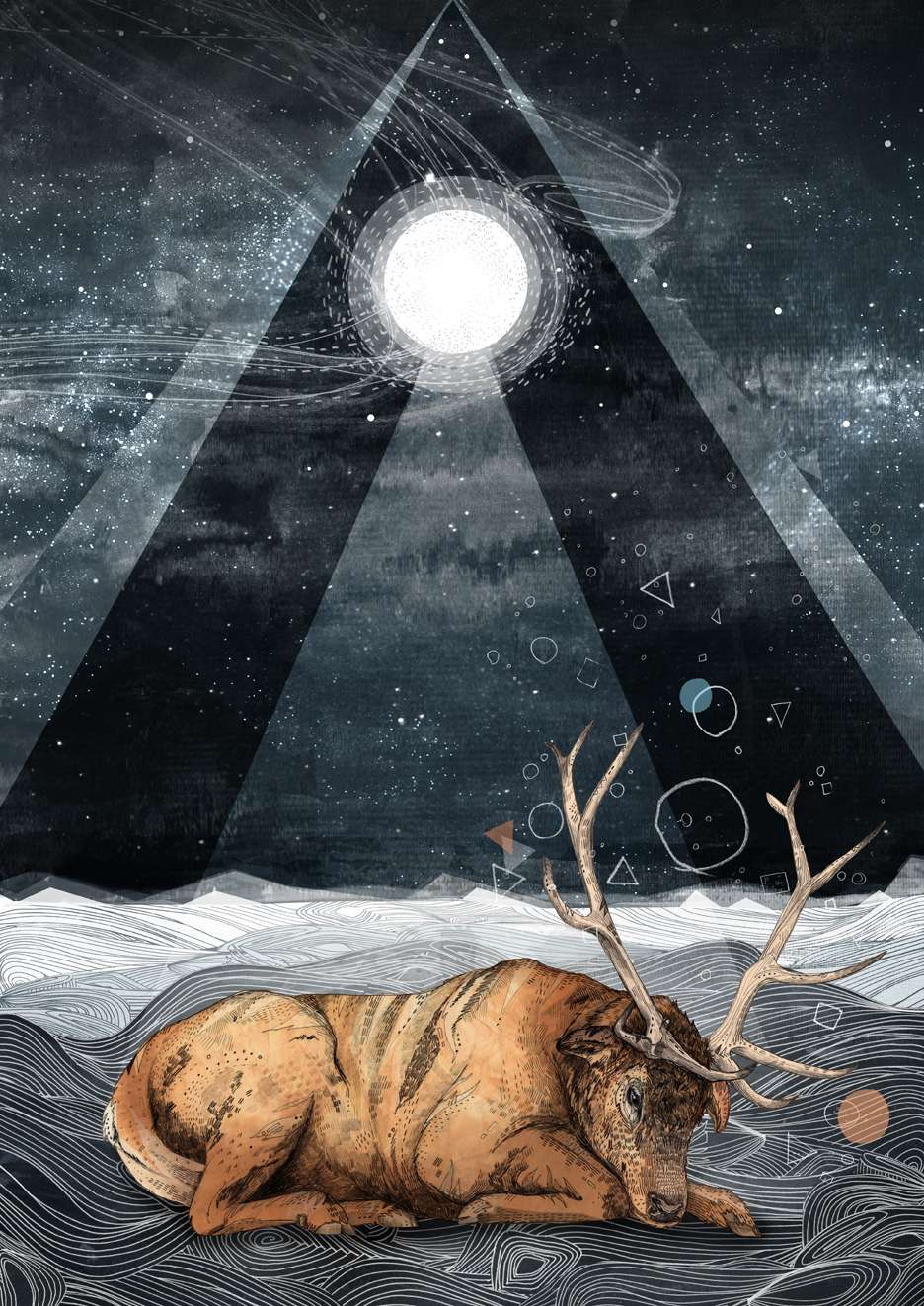
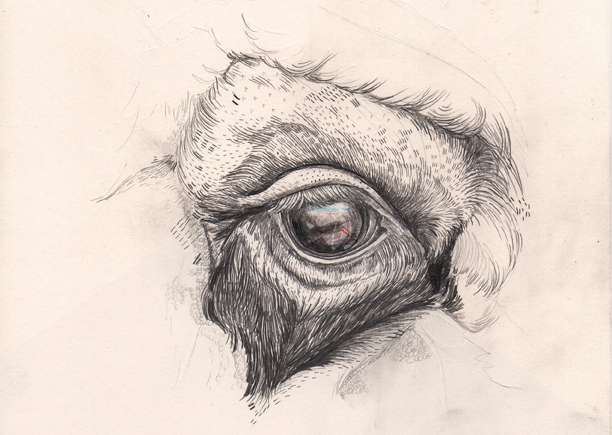

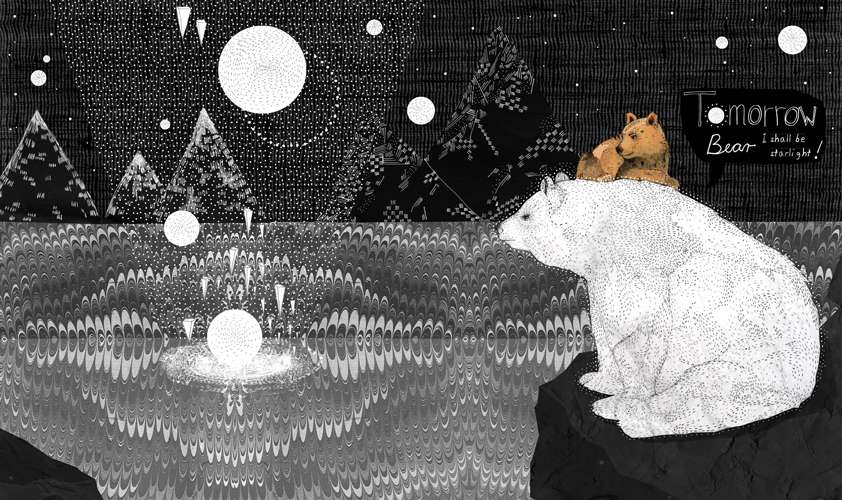
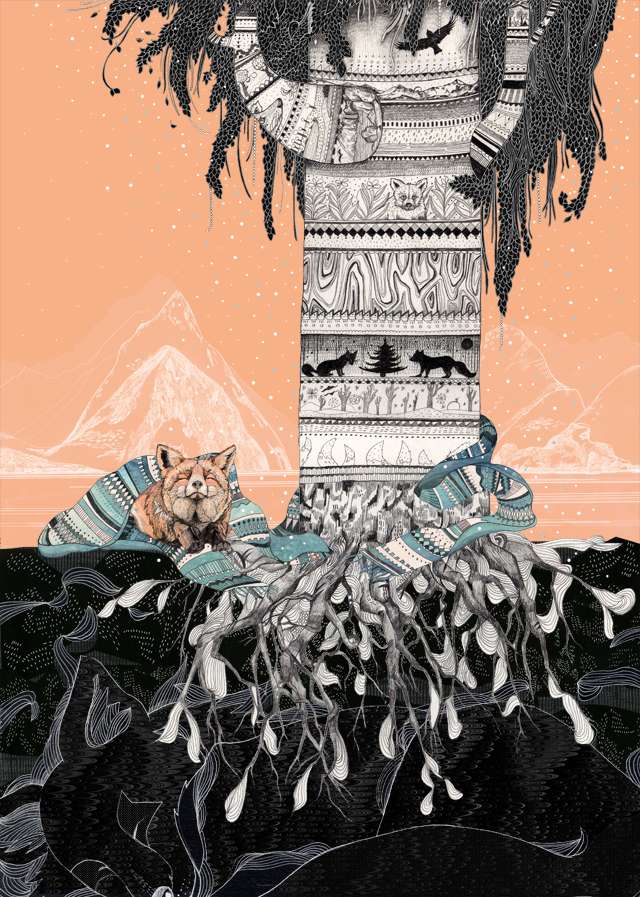
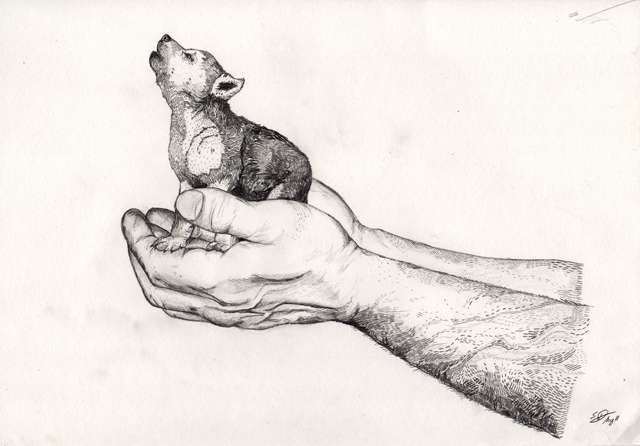
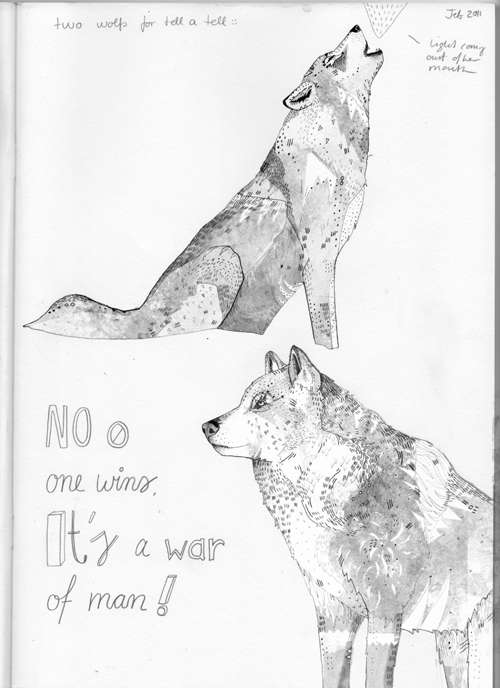
All images by Sandra Dieckmann. Sandra's Etsy.
Usually, when I've shared artists on Pony Gold, I've just talked about them in a very subjective way... But when the chance came up to let one of my favourite illustrators speak for herself via interview, I was excited to the point of nervous, and also a little intimidated.
I discovered Sandra Dieckmann's work at a totally formative time in my development as an artist, and I was hugely influenced by her use of patterning, and her hand drawn, almost naive, style.
So I was absolutely stoked and honoured that I had the following conversation with the inimitable Sandra, because I feel like she passed on a lot of artist -- and just plain human -- wisdom.
Read on for the interview...
What's your main theme for your talk at Semi-Permanent?
The message for me is just that you can go your own way, create a life for yourself, and use bad things that happen in life for something positive. And just do what you love, really, and that you can learn anything you want to learn.
There's a really nice quote saying that whenever people have needed something, they have just made it. So you just find ways of surviving (as an artist), like selling through Etsy.
Your background as an illustrator is a bit like that, isn't it? You sort of carved your own path...
With my personal path, I was born in Germany and had quite a beautiful childhood really. I explored Scandanavia, and I think that's where a lot of my inspiration comes from, and is still grounded in these really early impressions. When I was 13, my mother fell ill and she died when I was 16, so I spent three years caring for her -- she had a brain tumour -- so everything kind of stopped. My father wasn't a very nice person at the time either, so I ran away when I was 17, did my A levels and came to London when I was 19. I'd always been painting and making things -- like my entire life -- but when I was in London I had a time-out because i was a nanny for a year, and I had to run away from there (laughs). At the age of 20, I decided to go back (to school), and I did a pre-foundation and foundation in textiles and graphic design. Then I studied fashion at university, which was completely wrong because I wasn't that kind of girl. You know, I was chubby, I was a goth, I didn't fit in… I was like the outsider and they were all very, very posh and they had money behind them and they were quite bitchy. So I decided to transfer and studied graphic information and communication design, and that was a bit dry as well, although interesting.
But that was not what I wanted to do -- I did a few modules in illustration and created a children's book for my major project. I had so much fun doing it, and researching all the animals for it, that I just started illustrating all the time again, I just naturally felt good doing it. It was like therapy for myself, to make myself feel good.
I put it out on the web, on Flickr and stuff, and people really liked it and I was kind of surprised. So I kept on making more and more just for the fun of it, really, and it got to the stage when there were so many people blogging and talking about it and emailing that I had to look for a way to sell it. I found Etsy and started selling my work, and I guess the rest is history -- the blogs became websites and the websites became clients and everybody else has made my illustration career, I guess (laughs).
So it all happened pretty organically?
Yeah, very organically. And people say that to me: "Oh, you've got so many followers on Facebook, how do you do that?" and I just say, "Well... it just happened". I do have to say I worked really, really, hard; I've been working hard for years. It's not like you put a piece out and then sit on it, like on an egg, and wait for it to hatch. You have to keep on producing, night and day, and I'm lucky because I can't help it anyway (laughs), I'm constantly just making notes and drawing things. But I guess, be nice and work hard, that's definitely one. And get involved. I think what was really helpful for my career was not just partaking in exhibitions and illustration projects, but actually being proactive and setting up your own. I was running three projects at the time and just got to email so many illustrators that were at the same level as me, and I got to meet them and know them by name. I would meet them at exhibitions and get an idea of the community, and for me it was really great. And now its weird -- sometimes I meet people after three or four years, and I've known them for so long on Twitter and it all comes together.
You work very hard -- you said you're working night and day... is it a bit of a compulsion?
Yes, I think its a bit dangerous because it's like running away from life, it's like finding my way back home. I think, as a child, you're really impressionable and you build up these kind of dreamlike illusions, these kind of perfect places in your head. And I don't think you ever find those (again), so I think I just create them. I often have this compulsion to draw something I've dreamt. And I guess it's like catharsis, dealing with emotions and dealing with life. I have really vivid dreams -- I dreamt the other night that I scratched my arm and a portal opened up, and I looked into my arm and the universe was in my arm, there were stars and I could dive into it. Things happen -- and I don't want to be too spiritual -- but I guess they're sort of visions I have. With my work, it's not like I decide I want to draw a bear that looks nice. It's more like: I will possibly drink a bottle of whiskey and cry my heart out, because I'm losing my boyfriend again and I'll take our entire relationship apart and I will be up for two days and be like hallucinating -- I don't know how this happens -- I have these pictures in my head, and they're really clear, formed completely, ready, and I'll go from there. It's like I'm fighting with myself to bring to paper what I have in my head. So I just see things, I remember these things and i want to remake them so I can feel that thing again, or maybe communicate that feeling that I had.
What kind of reactions do people have to your work?
I guess when you've been illustrating for a few years it's really weird -- you find out that people connect to the images and they read them, either the same as you or really, really differently. Which is still valid really because it means a lot to them. I'll get emails from 10-year-old kids that are inspired, or somebody who has just lost his mother, who writes to me about buying my print and hanging it in the hallway during the last few weeks of her life and how they used to look at it, and it gave them strength. I get really, very personal responses to my work. Maybe because I was really personal when I created them. And it's also a lot to take on. Sometimes I feel like I'm a therapist and I'm there for other people to lean on and its quite a lot to take.
And I can't always react to everybody which is the saddest thing -- I had a lady email me a few times and I'm not sure what she was trying to say, but she was saying after all the abuse and all the years of miscarrying, she was telling me her entire life story and all about her violent relationship with her partner, and it all came out of this picture that she saw of mine. I read those emails and I take a breather, and then I'm probably myself really exhausted at the time, because I always am because I'm so intense (laughs), and I just sometimes don't get back at all because its too hard. If it's a child I will, definitely.
Do you find that upsetting?
Yeah I find it really hard. I would need like a thousand hours in a day and lots of hands and heads, because sometimes I have 180 emails and my commission to do I have ideas of my own and that's when it gets really sad. Because the natural way of working as an artist is to be touched by something, to jot it down, and to get to the picture as soon as you can -- just to keep the moment alive. But now, most of the time I'll put an idea in my (sketch)book and by the time I get back to it, I feel completely different and it has no meaning to me anymore, and so I can't paint or draw it.
I feel like a its a seesaw -- the busier and more popular you get, the less you have time to do your own thing. I don't want to say the quality of work suffers, but you need to retreat a little bit and the seesaw tips over and you have a little bit more time for yourself and you start generating lots of good work again. Then that work gets bought again and it invites more commissions and the seesaw tips again, so you're constantly going back and forward through this wave of being busy and then breathing again and creating your own stuff. I might have time for that pretty soon because I've just been asked by Random House in the UK… They wrote to me asking if I had ideas for writing and illustrating my own book, and that they would like to support that. So I think I'm going to go and start a maybe a story in that branch. I guess my work was never specialised in the first place; I never said I'm a children's book illustrator or I do editorial or whatever. I've realised that maybe rather than an illustrator, I'm an artist, although I have an illustrative style. Because lots of the work is self-initiated and came out of my own passion, and I sell it rahter than make it for somebody else,.
So I think thats what makes me most happy, doing it that way around.
Would that be a high point of your career?
Working with random house, yeah. I can never say high point because they're so different. I was working with street artists last year -- being outside, going up walls, painting furniture -- which was amazing and a great time. But I do like, I love stories, and it's definitely something that I hoped would happen, working with books, covers and contents.
The other highpoint of my career is all the lovely people -- just connecting and having so much feedback to offer. I don't want to go on about social networking but we're really exposed to a lot of work and a lot of competition, and it's also so educational and amazing to have this instant feedback. You know, you post something up on the blog or Facebook, and you know by peoples' response if you've hit the jackpot or not. It's not about creating for them, you're still doing it for yourself, but they can do something with it… It feels very nice that it means something to other perple. But then, I don't even know if that's always the truth, though. Some blogs and some websites will just post pictures of funny cats or bears and just rely on the cuteness factor and yeah, this sells, this always works, I'll get like 600 ticks on this, and I don't ever want to go there. Because although I love communicating through animals, I do take them seriously. They're like vessels, they're not "Oh yeh, that looks nice".
How did you develop a style that's so unique?
First of all, craftsmanship can be really important. I don't want to say its essential, but a lot of naive work really stands out. And you shouldn't try to create something that you're not made for, don't work against your own design. You're either a crafter and a hard worker -- like I am -- and there's a lot of detail in your work and a lot of attention, or you're someone who communicates in a completely different way. Someone that puts a splodge on the page and does it really well, and edits it very well. Simple illustration is a lot about editing. Whereas someone who is very complex can impress with detail. It depends on your character, what you personally like doing. And when you find out what you like doing and what you find aesthetically pleasing, yourself, then just pursue that and work on it. Honestly, if you're the kind of person that goes to work, and you have to force yourself to draw something at night, then it might not be for you. Because it's not about making the decision that you want to be an illustrator, you are that already (or you're not). And it just takes time to come out, the style. You need to make mistakes, that's really important. You learn from mistakes and they stick with you. You can't just read a 'How to be an illustrator' book. Everything can be helpful, but your own experiences are most valid. And just put a lot of hours and try lots of different things, and every time you find a point that you feel comfortable with, keep it and put it in your book, and keep on going with the same thing.
The other day I was looking at The Bumble Bear and the Grizzly Bee, which is the children's book I made in university, and it' made with collage as well as illustration. I remember experimenting with collage and paper right at the beginning and just because I needed a better tool, to save time, I started teaching myself Photoshop. People talk about technology as tools, and Photoshop is amazing because it can save a lot of time, and you can keep the authenticity and mistakes while you're using it -- you know, it's not as clean as vector art, thats something I'm not so keen on. When I worked with Photoshop for the first time I was really surprised what I could do with it, and then I built upon that, finding out more things. Teaching yourself is a very good way, with whatever tools you're using, if they're digital or non-digital. Just facilitate your own work, find ways -- you have an idea and you need to get there somehow, so you find a way of turning it into reality. Be really stubborn and work towards that.
It was actually your work that influenced me to have a look at Photoshop in a different way.
I don't really like my work to look anything like it was worked on in Photoshop. Often when i give my work to stockists, they'll be like: "How did you make this?" And the clue is that everything in my images is handmade, but it's just assembled. I don't use any brushes, I don't use anything that Photoshop offers. You can give me Photoshop CS1 and I'll be completely happy, because it's not about the technology. I don't need anything -- I need the cutting tool, I need to change the hue, and that's about it. There's nothing that I change: all the textures are made by hand -- all the mistakes, all the drawings -- and it's just nice to be able to assemble something. Technology can help you erase your weaknesses. If I'm not very good at composition, then Photoshop can offer that window to try with composition until i get there. I can see the impression of the animal (I'm drawing) on my inner eye, inside my head. I know the feeling, I know the colour probably, I know the setting, but putting it all together… it's a matter of 'This is the moment when it feels right, and let me just leave it'.
Who were you influenced by?
I would split this into direct and indirect inspiration -- I'm hugely influenced by music. I listen to a lot of obscure german progressive Krautrock and I enjoy finding new music and it making me feel something, because its always about feelings, and also films, sometimes but not so often. Other artists… I don't know really. I look at other artists and think 'Well done', or 'Oh my God, I love the colours', but I just don't think their work influences me to produce work. It's the small things, interpersonal stuff, definitely heritage and where I come from, early impressions, all the stuff that you can soak up as a child, and maybe it's also psychological makeup. Maybe if you've had hardship, or are wanting to get somewhere, or missing something, or just being perhaps a really hard-thinking person or an angsty person -- whatever, whatever person you are -- or if you're quite neurotic in some kind of way, you might find it really helpful to create. That kind of fuels it as well.
Thanks for your time Sandra!
Sandra's website.
There's a really nice quote saying that whenever people have needed something, they have just made it. So you just find ways of surviving (as an artist), like selling through Etsy.
Your background as an illustrator is a bit like that, isn't it? You sort of carved your own path...
With my personal path, I was born in Germany and had quite a beautiful childhood really. I explored Scandanavia, and I think that's where a lot of my inspiration comes from, and is still grounded in these really early impressions. When I was 13, my mother fell ill and she died when I was 16, so I spent three years caring for her -- she had a brain tumour -- so everything kind of stopped. My father wasn't a very nice person at the time either, so I ran away when I was 17, did my A levels and came to London when I was 19. I'd always been painting and making things -- like my entire life -- but when I was in London I had a time-out because i was a nanny for a year, and I had to run away from there (laughs). At the age of 20, I decided to go back (to school), and I did a pre-foundation and foundation in textiles and graphic design. Then I studied fashion at university, which was completely wrong because I wasn't that kind of girl. You know, I was chubby, I was a goth, I didn't fit in… I was like the outsider and they were all very, very posh and they had money behind them and they were quite bitchy. So I decided to transfer and studied graphic information and communication design, and that was a bit dry as well, although interesting.
But that was not what I wanted to do -- I did a few modules in illustration and created a children's book for my major project. I had so much fun doing it, and researching all the animals for it, that I just started illustrating all the time again, I just naturally felt good doing it. It was like therapy for myself, to make myself feel good.
I put it out on the web, on Flickr and stuff, and people really liked it and I was kind of surprised. So I kept on making more and more just for the fun of it, really, and it got to the stage when there were so many people blogging and talking about it and emailing that I had to look for a way to sell it. I found Etsy and started selling my work, and I guess the rest is history -- the blogs became websites and the websites became clients and everybody else has made my illustration career, I guess (laughs).
So it all happened pretty organically?
Yeah, very organically. And people say that to me: "Oh, you've got so many followers on Facebook, how do you do that?" and I just say, "Well... it just happened". I do have to say I worked really, really, hard; I've been working hard for years. It's not like you put a piece out and then sit on it, like on an egg, and wait for it to hatch. You have to keep on producing, night and day, and I'm lucky because I can't help it anyway (laughs), I'm constantly just making notes and drawing things. But I guess, be nice and work hard, that's definitely one. And get involved. I think what was really helpful for my career was not just partaking in exhibitions and illustration projects, but actually being proactive and setting up your own. I was running three projects at the time and just got to email so many illustrators that were at the same level as me, and I got to meet them and know them by name. I would meet them at exhibitions and get an idea of the community, and for me it was really great. And now its weird -- sometimes I meet people after three or four years, and I've known them for so long on Twitter and it all comes together.
You work very hard -- you said you're working night and day... is it a bit of a compulsion?
Yes, I think its a bit dangerous because it's like running away from life, it's like finding my way back home. I think, as a child, you're really impressionable and you build up these kind of dreamlike illusions, these kind of perfect places in your head. And I don't think you ever find those (again), so I think I just create them. I often have this compulsion to draw something I've dreamt. And I guess it's like catharsis, dealing with emotions and dealing with life. I have really vivid dreams -- I dreamt the other night that I scratched my arm and a portal opened up, and I looked into my arm and the universe was in my arm, there were stars and I could dive into it. Things happen -- and I don't want to be too spiritual -- but I guess they're sort of visions I have. With my work, it's not like I decide I want to draw a bear that looks nice. It's more like: I will possibly drink a bottle of whiskey and cry my heart out, because I'm losing my boyfriend again and I'll take our entire relationship apart and I will be up for two days and be like hallucinating -- I don't know how this happens -- I have these pictures in my head, and they're really clear, formed completely, ready, and I'll go from there. It's like I'm fighting with myself to bring to paper what I have in my head. So I just see things, I remember these things and i want to remake them so I can feel that thing again, or maybe communicate that feeling that I had.
What kind of reactions do people have to your work?
I guess when you've been illustrating for a few years it's really weird -- you find out that people connect to the images and they read them, either the same as you or really, really differently. Which is still valid really because it means a lot to them. I'll get emails from 10-year-old kids that are inspired, or somebody who has just lost his mother, who writes to me about buying my print and hanging it in the hallway during the last few weeks of her life and how they used to look at it, and it gave them strength. I get really, very personal responses to my work. Maybe because I was really personal when I created them. And it's also a lot to take on. Sometimes I feel like I'm a therapist and I'm there for other people to lean on and its quite a lot to take.
And I can't always react to everybody which is the saddest thing -- I had a lady email me a few times and I'm not sure what she was trying to say, but she was saying after all the abuse and all the years of miscarrying, she was telling me her entire life story and all about her violent relationship with her partner, and it all came out of this picture that she saw of mine. I read those emails and I take a breather, and then I'm probably myself really exhausted at the time, because I always am because I'm so intense (laughs), and I just sometimes don't get back at all because its too hard. If it's a child I will, definitely.
Do you find that upsetting?
Yeah I find it really hard. I would need like a thousand hours in a day and lots of hands and heads, because sometimes I have 180 emails and my commission to do I have ideas of my own and that's when it gets really sad. Because the natural way of working as an artist is to be touched by something, to jot it down, and to get to the picture as soon as you can -- just to keep the moment alive. But now, most of the time I'll put an idea in my (sketch)book and by the time I get back to it, I feel completely different and it has no meaning to me anymore, and so I can't paint or draw it.
I feel like a its a seesaw -- the busier and more popular you get, the less you have time to do your own thing. I don't want to say the quality of work suffers, but you need to retreat a little bit and the seesaw tips over and you have a little bit more time for yourself and you start generating lots of good work again. Then that work gets bought again and it invites more commissions and the seesaw tips again, so you're constantly going back and forward through this wave of being busy and then breathing again and creating your own stuff. I might have time for that pretty soon because I've just been asked by Random House in the UK… They wrote to me asking if I had ideas for writing and illustrating my own book, and that they would like to support that. So I think I'm going to go and start a maybe a story in that branch. I guess my work was never specialised in the first place; I never said I'm a children's book illustrator or I do editorial or whatever. I've realised that maybe rather than an illustrator, I'm an artist, although I have an illustrative style. Because lots of the work is self-initiated and came out of my own passion, and I sell it rahter than make it for somebody else,.
So I think thats what makes me most happy, doing it that way around.
Would that be a high point of your career?
Working with random house, yeah. I can never say high point because they're so different. I was working with street artists last year -- being outside, going up walls, painting furniture -- which was amazing and a great time. But I do like, I love stories, and it's definitely something that I hoped would happen, working with books, covers and contents.
The other highpoint of my career is all the lovely people -- just connecting and having so much feedback to offer. I don't want to go on about social networking but we're really exposed to a lot of work and a lot of competition, and it's also so educational and amazing to have this instant feedback. You know, you post something up on the blog or Facebook, and you know by peoples' response if you've hit the jackpot or not. It's not about creating for them, you're still doing it for yourself, but they can do something with it… It feels very nice that it means something to other perple. But then, I don't even know if that's always the truth, though. Some blogs and some websites will just post pictures of funny cats or bears and just rely on the cuteness factor and yeah, this sells, this always works, I'll get like 600 ticks on this, and I don't ever want to go there. Because although I love communicating through animals, I do take them seriously. They're like vessels, they're not "Oh yeh, that looks nice".
How did you develop a style that's so unique?
First of all, craftsmanship can be really important. I don't want to say its essential, but a lot of naive work really stands out. And you shouldn't try to create something that you're not made for, don't work against your own design. You're either a crafter and a hard worker -- like I am -- and there's a lot of detail in your work and a lot of attention, or you're someone who communicates in a completely different way. Someone that puts a splodge on the page and does it really well, and edits it very well. Simple illustration is a lot about editing. Whereas someone who is very complex can impress with detail. It depends on your character, what you personally like doing. And when you find out what you like doing and what you find aesthetically pleasing, yourself, then just pursue that and work on it. Honestly, if you're the kind of person that goes to work, and you have to force yourself to draw something at night, then it might not be for you. Because it's not about making the decision that you want to be an illustrator, you are that already (or you're not). And it just takes time to come out, the style. You need to make mistakes, that's really important. You learn from mistakes and they stick with you. You can't just read a 'How to be an illustrator' book. Everything can be helpful, but your own experiences are most valid. And just put a lot of hours and try lots of different things, and every time you find a point that you feel comfortable with, keep it and put it in your book, and keep on going with the same thing.
The other day I was looking at The Bumble Bear and the Grizzly Bee, which is the children's book I made in university, and it' made with collage as well as illustration. I remember experimenting with collage and paper right at the beginning and just because I needed a better tool, to save time, I started teaching myself Photoshop. People talk about technology as tools, and Photoshop is amazing because it can save a lot of time, and you can keep the authenticity and mistakes while you're using it -- you know, it's not as clean as vector art, thats something I'm not so keen on. When I worked with Photoshop for the first time I was really surprised what I could do with it, and then I built upon that, finding out more things. Teaching yourself is a very good way, with whatever tools you're using, if they're digital or non-digital. Just facilitate your own work, find ways -- you have an idea and you need to get there somehow, so you find a way of turning it into reality. Be really stubborn and work towards that.
It was actually your work that influenced me to have a look at Photoshop in a different way.
I don't really like my work to look anything like it was worked on in Photoshop. Often when i give my work to stockists, they'll be like: "How did you make this?" And the clue is that everything in my images is handmade, but it's just assembled. I don't use any brushes, I don't use anything that Photoshop offers. You can give me Photoshop CS1 and I'll be completely happy, because it's not about the technology. I don't need anything -- I need the cutting tool, I need to change the hue, and that's about it. There's nothing that I change: all the textures are made by hand -- all the mistakes, all the drawings -- and it's just nice to be able to assemble something. Technology can help you erase your weaknesses. If I'm not very good at composition, then Photoshop can offer that window to try with composition until i get there. I can see the impression of the animal (I'm drawing) on my inner eye, inside my head. I know the feeling, I know the colour probably, I know the setting, but putting it all together… it's a matter of 'This is the moment when it feels right, and let me just leave it'.
Who were you influenced by?
I would split this into direct and indirect inspiration -- I'm hugely influenced by music. I listen to a lot of obscure german progressive Krautrock and I enjoy finding new music and it making me feel something, because its always about feelings, and also films, sometimes but not so often. Other artists… I don't know really. I look at other artists and think 'Well done', or 'Oh my God, I love the colours', but I just don't think their work influences me to produce work. It's the small things, interpersonal stuff, definitely heritage and where I come from, early impressions, all the stuff that you can soak up as a child, and maybe it's also psychological makeup. Maybe if you've had hardship, or are wanting to get somewhere, or missing something, or just being perhaps a really hard-thinking person or an angsty person -- whatever, whatever person you are -- or if you're quite neurotic in some kind of way, you might find it really helpful to create. That kind of fuels it as well.
Thanks for your time Sandra!
Sandra's website.

I looovee Sandra's work! --I have been a fan of hers for a while now. She has this really unique realistic quality about her work that I find to be fascinating because of her illustrative nature.
ReplyDelete<3
xx
~Taylor
www.forsurejadore.com
Her work is incredible! And she has the sweetest, brightest personality to match. X
Deletei love this! She has been one of my favorites for a long time and it's so nice to read an interview with her. What a gift. Thank you!
ReplyDelete